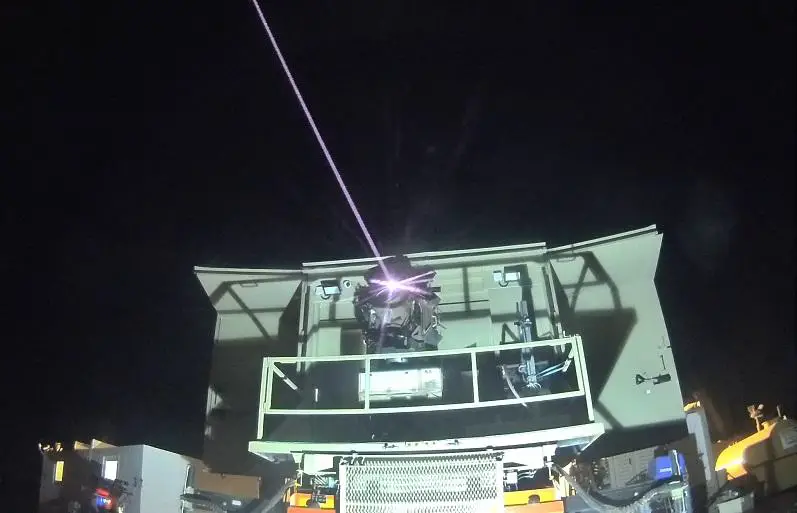RAFAEL alongside the Israeli Ministry of Defense’s Directorate of Defense Research and Development (DDR&D) have successfully completed a series of ground-breaking tests with a high-power laser interception system against steep-track threats. The demonstrator successfully intercepted UAVs, mortars, rockets, and anti-tank missiles in various scenarios. The system is designed to destroy short-range rockets, artillery, and mortar bombs; it has a range of up to 7 km (4.3 mi), too close for the Iron Dome system to intercept projectiles effectively. In addition, the system could also intercept unmanned aerial vehicles (UAVs). Iron Beam will constitute the fifth element of Israel’s integrated air defense system, in addition to Arrow 2, Arrow 3, David’s Sling, and Iron Dome.[7] However, Iron Beam can be used stand-alone.
RAFAEL’s Iron Beam provides Israel with a capability unlike one seen elsewhere in the world by successfully developing a high-power laser technology at an operational standard with operational interception capabilities. The tests are the first phase of a multi-year programme led by the DDR&D and defence industries. The programme aims to develop a high-power ground and aerial laser system equipped to deal with long-range, high-intensity threats. The laser will complement the ‘Iron Dome’ system and will be an effective and economically efficient addition to Israel’s multi-tiered air defence array. The system’s development plan is led by the Research and Development Division in the Ministry of Defense’s DDR&D. This is the world’s first energy-based weapons system that uses a laser to shoot down incoming UAVs, rockets & mortars at a cost of $3.50 per shot.

CEO and President, Rafael Advanced Defense Systems, Maj. Gen. (Res.) Yoav Har Even: “RAFAEL is proud to have completed this initial series of tests with the world’s most innovative high-power laser. The successful tests included the interception of a wide range of threats and have proven the system’s remarkable capabilities. Our cooperation with the DDR&D and the Ministry of Defense has led to this extraordinary development, constituting a significant milestone in the process to achieve operational capability. I am confident that this technological breakthrough will lead to future capabilities in directed energy, including the high-power laser system. This achievement is the result of RAFAEL employees’ tireless work contributing to Israel’s security while preserving and developing technological capabilities to ensure Israel’s qualitative advantage.”
Head of DDR&D, Brig. Gen. (Res.) Daniel Gold: “The DDR&D leads significant research and development programs in various technological fields that support the IDF and the State of Israel. The high-power laser system will form an integral part of Israel’s multi-tiered air defence array. This technological breakthrough has come at a time when the operational demand for the system is at an all-time high. These tests have been a great success thanks to the creativity, innovation, and knowledge inherent in the research and development processes. In recent years, the DDR&D has led the laser program in partnership with the IDF and the defence industry, under the command of the DDR&D’s Head of R&D, Brig. Gen. Yaniv Rotem. They are the people who turned vision into reality. The DDR&D will continue to lead the research, knowledge, and technological developments that form the base of the ground-breaking systems used to protect the State of Israel.”

Iron Beam uses a fiber laser to destroy an airborne target within 4–5 seconds of firing. Whether acting as a stand-alone system or with external cueing as part of an air-defense system, a threat is detected by a surveillance system and tracked by vehicle platforms in order to engage. The main benefits of using a directed energy weapon over conventional missile interceptors are lower costs per shot, unlimited number of firings, lower operational costs, and less manpower. There is also no interceptor debris to fall on the area protected. The cost of each interception is negligible, unlike expensive missile interceptors—around US$2,000 per shot to cover all costs, against $100,000 to $150,000 per interceptor firing.
In 2016 laser power levels were reported to be “tens of kilowatts” with increases planned to hundreds of kW. Rafael was also pursuing increasing the range of the system and partnering with other companies to further develop the prototype. The system is based on five years of research and development in solid-state lasers and is developed by Rafael, funded by the MoD, and extensively underwritten by the United States. An Iron Beam battery is mobile and composed of an air defense radar, a command and control (C2) unit, and two HEL (High Energy Laser) systems. It is intended for two laser guns to initially produce 100-150 kw of power. While official information is not available, a 2020 report said that Iron Beam was thought to have a maximum effective range of up to 7 km, and could destroy missiles, UAVs (drones), and mortar shells around four seconds after the twin high-energy fiber-optic lasers make contact with their target.
















